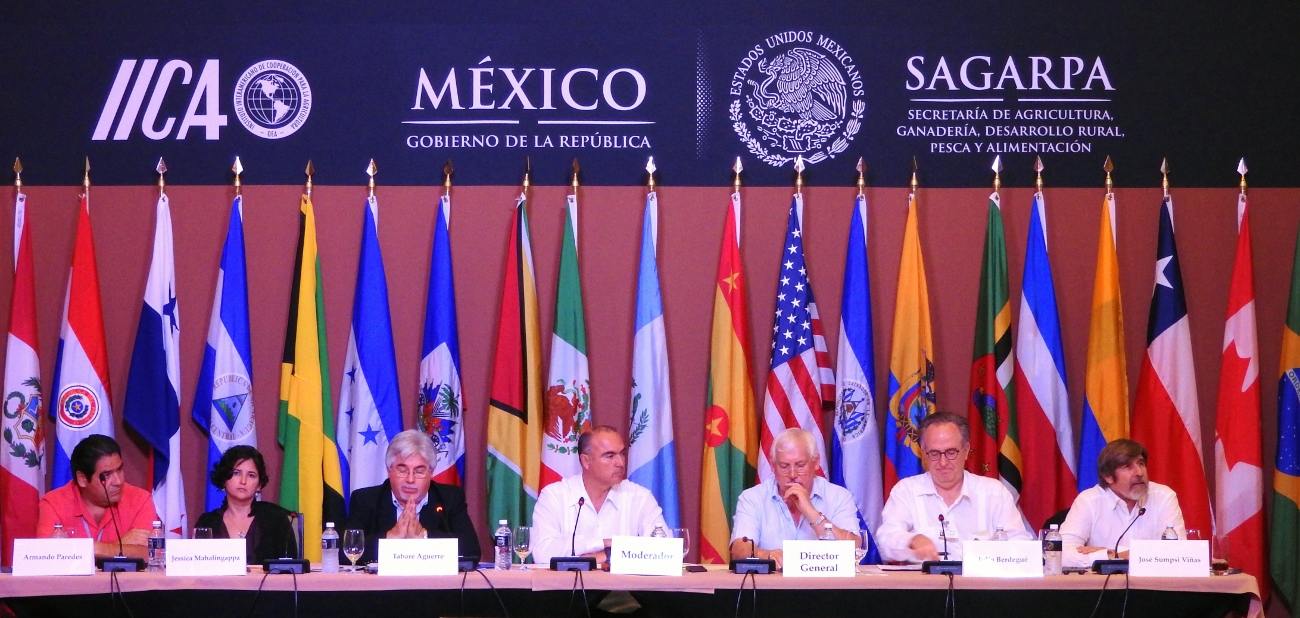Ministers of Agriculture of the Americas engage in dialogue on achieving sustainable and inclusive agricultural productivity

Cancun, 21 October 2015 (IICA). Within the framework of the Meeting of Ministers of Agriculture of the Americas 2015, which began in Mexico on October 20, agricultural specialists supported the ministerial deliberations through a technical forum organized by the Inter-American Institute for Cooperation on Agriculture (IICA).
Ministers and secretaries of agriculture of the Americas, meeting on the Riviera Maya in Quintana Roo, Mexico, engaged in an in-depth discussion of the technical document Toward Competitive, Sustainable and Inclusive Productivity: Opportunity for Agriculture in the Americas, contributed by IICA with the aim of supporting the dialogue, adopting commitments, and requesting support from international cooperation agencies for the sustainable and inclusive development of the agricultural sector.
During the inauguration of the forum, José Calzada Rovirosa, Secretary of Agriculture, Livestock, Rural Development, Fisheries and Food (SAGARPA) of Mexico, called on the ministers present to establish priorities and find alternative ways of making agriculture a sustainable and productive activity. The Government of Mexico organized the event with assistance from the Institute.
Increasing agricultural productivity in an inclusive way and using resources in a sustainable manner is one of the main challenges faced by this diverse continent, which has the potential to become an important supplier of food to the world, given the water, land, energy and biodiversity at its disposal, as well as its wealth of human talent.
The Director General of IICA, Víctor M. Villalobos, explained that there were four basic reasons why the issue of productivity warranted such careful analysis: the demand for food, natural resources, exclusion and climate change. “It is clear that we have overexploited our resources and there are indications that we can produce more and better with less water,” he observed. He also highlighted the need to strengthen international cooperation through agendas geared to the sustainable strengthening of agriculture, with a view to closing the gaps in productivity that exist.
In the face of the challenges posed by climate change, the goal of more intensive sustainable production can only be achieved by reducing the sector’s vulnerability, obtaining higher yields per hectare and per unit of water, preventing deforestation, and restoring degraded land.
One of the participants in the dialogue on inclusive and sustainable agricultural productivity was Tabaré Aguerre, Minister of Livestock, Agriculture and Fisheries of Uruguay, who affirmed that it was essential to protect natural resources, generate systems to provide information for decision making, democratize access to such information, improve the infrastructure in which agriculture operates, develop financial tools for risk management, and strengthen the institutional arrangements to make agriculture an opportunity for development and productivity, regardless of the scale on which it is carried out.
Julio Berdegué, from the Latin American Center for Rural Development, pointed out that Latin America was basically a region of smallholders and family farmers, and that the countries of the Americas needed to focus their efforts on generating public goods such as infrastructure and innovation to increase the productivity of the estimated 15 million such farmers.
The USDA’s Dr. Jessica Mahalingappa emphasized that “achieving a common policy on food health and safety standards could help convert this hemisphere into a world leader in agriculture.”
The panel of international experts was made up of Mahalingappa, Berdegué and Aguerre, and José María Sumpsi from the Polytechnic University of Madrid, and Armando Paredes, from Agroindustrias APAL S.A.
Over the past 20 years, almost all the countries have succeeded in increasing total factor productivity. According to the experts, this is due in part to the positive impact of new technologies, the more efficient use of inputs, and the increased productivity of human capital.
Policies that foster the development of the sector, modern agricultural education, the strengthening of agricultural innovation systems, the consolidation of the region’s leadership in international trade, and the promotion of an entrepreneurial culture are some of the points included in the hemispheric cooperation agenda that IICA will propose to the ministers, offering them the experience it has gained throughout its 73 years at the service of agriculture in the Americas.
The meeting, which will end on October 22, seeks to build consensus among the ministers and secretaries of agriculture, who will issue a declaration in which they are expected to commit to implementing strategic actions that will enable agriculture in the Americas to increase productivity in a sustainable and inclusive manner.
Ministers learn about global and regional initiatives
Prior to the technical forum, the Deputy Minister of Agriculture, Agrifood and Forestry of France, Catherine Geslain-Laneelle, gave a presentation on the “4 per 1000” initiative related to soil management to reduce the effect of greenhouse gases.
In view of the challenge of ensuring the sustainability of agriculture, Geslain-Laneelle stressed that “agriculture is a key element for counteracting climate change” and expressed readiness to support initiatives for the sustainable use of natural resources in the Americas, one of the key challenges involved in the ministerial discussion, along with productivity and inclusion in agriculture.
During the forum, the Minister of Agriculture, Livestock and Food Supply of Brazil, Mrs. Kátia Abreu, presented a report on the Inter-American Meeting of National Animal and Plant Health and Food Safety Services in the Face of the Challenges of International Trade, which was held in Brasilia from September 2-3.
Abreu believes that strengthening the strategies and mechanisms employed by multilateral and regional cooperation to contribute to the harmonization of phytosanitary standards in the countries of the Americas would make it possible to generate more trade among countries.
More information: